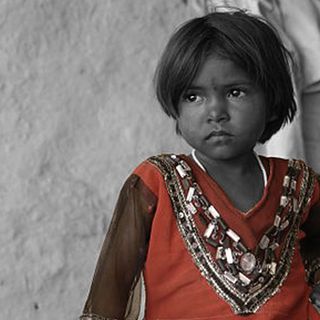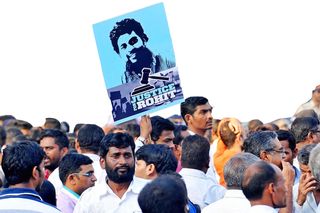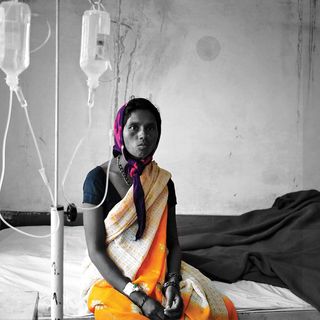
We Need to Reframe Mental Health as a Social Justice Issue, Not a Personal Problem
Therapy that does not address root causes of social oppression is a band-aid solution.

“You have had battles they did not have because you will have blessings they will not have.”
I found this quote in the vast and wonderful forest of Instagram handles that talk about mental health and peddle a faulty, incomplete approach to dealing with mental health issues. This quote and approach place an individual and their emotional life at the center of the conversation around mental health, without considering the fact that all of life is experienced from specific social locations.
Like all invisible things, difficult mental health struggles is forced to live on a threshold. It cannot be contained within the person experiencing it, even if they never speak directly about it, for it will make its presence felt in life, in relationships, in work, in conversations. And it cannot be freely expressed because of the ability of stigma to transform what is real and felt into what can be questioned and ridiculed. And so it exists, neither fully hidden nor completely expressed, in a liminal space that continues to burden the person living with it.
No one’s mental health exists in a vacuum — and it should go without saying that individuals are affected deeply not only by their own experiences but their experiences with families, friends, communities, and society at large.
Placed in that context, the conversation about mental health immediately becomes more complicated. The individual-centric approach to mental health care creates a hero’s journey narrative in which individual struggles are justified almost as a means to an end — in which certain things are okay, even necessary to experience because of the gifts and lessons that await the person who is suffering at the end.
Related on The Swaddle:
It’s Time For A More Humane Approach to Mental Health Care
This assertion is not only absurd, but downright cruel when one considers how mental health is affected by gender identity, sexual orientation, caste and class location, disability, age, as well as the experience of traumatic events. Let us consider a few examples of this.
Historically, transgender people’s very identity was characterized by the medical establishment as a mental health condition. It is only as of last month that being trans is no longer pathologized by the World Health Organization. We know that trans people face discrimination at all levels, from education to employment to access to housing and health care. This discrimination inevitably impacts the mental health and well-being of trans communities, and might even lead to mental health issues for some trans people. How can this entirely unnecessary, preventable ordeal be justified by an individual-centric approach that ultimately holds the person who is already suffering responsible for their own well-being?
Similarly, anti-caste writers and thinkers have explored the connection between ableism and casteism in the fact that therapy is both difficult to access for most, and that even when it is accessed, many practitioners are casteist. In an article on Skin Stories (a publication I edit) exploring access to health care and caste, Rachelle Bharathi Chandran writes, “Caste plays a role in what help we get in terms of health care. It decides if we can get adequate care, blood transfusions, organ donations. It’s that feeling of loneliness when we don’t know of places where we can speak about our lives, and hope that our journey is understood.”
In another article on Roundtable India, Divya Kandukuri, founder of the Blue Dawn mental health care group, writes, “One cannot and should not talk about mental health in isolation. One has to look at the sociological, that is, caste and class dynamics of it. Since the discussion around mental health is a trend in white/upper caste spaces, as they tend to love romanticization of the pain (by saying this I am not nullifying your pain but just stating the facts); the moment Bahujans speak about their health issues, they become a troll or it’s tagged as ‘imitation.’”
The very marginalization that gives rise to emotional distress also ensures that support, care and understanding is not available for marginalized people. Borderline personality disorder is overdiagnosed in women and non-binary people, without considering the fact that gender-based discrimination gives rise to traumatic experiences that disproportionately impact gender minorities. A recent article in The Conversation argues that the condition needs to be recognized as a response to trauma. Given that gender minorities are the victims of a disproportionate amount of sexual and physical abuse, this makes the “disorder” a gendered experience.
Related on The Swaddle:
Netflix’s ‘One Day At A Time’ Shows There’s No Right Way to Cope With Mental Health Issues
There are several under-researched physical diseases that impact the health of women and non-binary folks. I live with a chronic illness called endometriosis, which causes a host of symptoms including chronic fatigue and pain. Despite the fact that millions of people who menstruate live with endometriosis, the gendered nature of the disease means that the scientific establishment has not put its weight behind finding a cause, or even a cure. This disparity is again compounded by caste and class location, which in turn, can be detrimental to certain groups’ mental health.
Mental health is also obviously impacted by the political and economic structures within which we live.
The rise of right-wing, xenophobic governments around the world, war, conflict, the refugee crisis, and the climate crisis, have all had a documented impact on some of the most marginalized people around the world, such as indigenous people who face threats to their land rights, or refugees and asylum seekers.
Close to home, reports are still trickling in about how Cyclone Fani has affected the mental health of survivors. The devastating consequences of the cyclone – lost lives, damaged home, and impaired access to basic necessities — is leading to emotional distress among the survivors, whose mental health professionals say are living with post-traumatic stress. Elsewhere, in Assam, people who have spent their entire lives in India have been put in detention centers and face separation from their families and friends, and deportation.
The news cycle itself is a deep cause for despair — minorities are being killed in broad daylight, with impunity. Our cities face a grave water crisis. The world faces what has been called a “climate apartheid” – in which scarcity is hitting marginalized communities more than the wealthy and powerful. Talking about mental health only on individual, personal terms ignores these political realities.
Does this mean that mental health cannot or should not be addressed at all? No, but it does mean that everything from individual therapy practices to government policies needs to start looking at mental health from a social justice standpoint, a feat undertaken solely by mental health advocates for now. This will allow us to improve access to health care and improve its quality — and equally, to look at the root causes of emotional distress that is stemming from injustice.
Yes, every human being has the right to make decisions about their own mental health. This includes the setting of boundaries, processing difficult emotions, navigating the complexity of entire lives and histories and relationships. But to separate the stuff of life from the huge external systems and realities within which we live is a fool’s game. It will not get us far. These “blessings” are not wanted, because these “battles” are entirely unjust.
Shreya Ila Anasuya is a writer of fiction and non-fiction, an independent journalist, and the managing editor of Skin Stories, a digital publication on disability, sexuality, and gender housed at the non-profit, Point of View.
Related


AIIMS Fire Is Symbolic of India’s Flailing Public Health Care System
